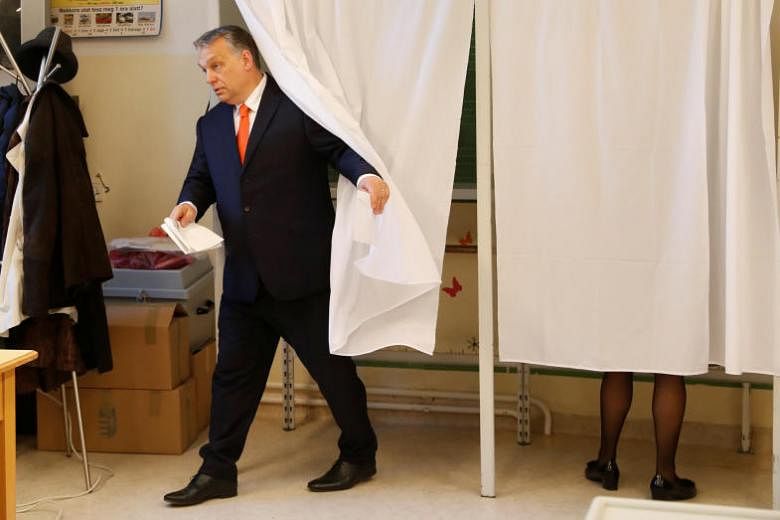BUDAPEST (Reuters, AFP) - Hungary's Viktor Orban, a hard-liner on immigration in Europe, pledged to "fight" for his country after casting his vote on Sunday (April 08) in an election that was expected to give him a third straight term in office.
After an acrimonious campaign in which Orban projected himself as a saviour of Hungary's Christian culture against Muslim migration into Europe, all opinion polls put his Fidesz party well ahead.
A strong victory could embolden him to put more muscle into a Central European alliance against the European Union's migration policies. Orban, Hungary's longest-serving post-communist premier, strongly opposes deeper integration of the bloc.
A landslide win would make Orban feel vindicated in his decision to run a single-issue campaign, arguing that migration posed a big security threat. His critics said his stance has fuelled xenophobia in Hungary.
After casting his vote in a wealthy district of Budapest with his wife, Orban said Hungary's future was at stake in the vote.
"From here I will go and take part in mobilising voters... I voted for Fidesz and I am asking everyone to take part in the election," Orban told a group of dozens of journalists.
Asked whether he was fighting the EU he said: "The EU is not in Brussels. The EU is in Berlin, in Budapest, in Prague and in Bucharest."
He reiterated he would stand up for Hungary's interests and said Hungary was a loyal member of international organisations.
"We love our country and we are fighting for our country,"Orban said.
Around 7.9 million Hungarians are eligible to vote and turnout figures will be closely watched for any clues of a possible upset. A mainly first-past-the-post election system designed by Orban's right-wing Fidesz party gives it an edge over a divided opposition but a high turnout and anti-Fidesz tactical voting could add an element of unpredictability.
Polling stations opened at 6.00 am local time and will stay open until 7.00 pm local time. Preliminary results are expected one or two hours after polls close, with broader trends expected to become clear only slowly over the course of the evening.
A strong win for Orban would also boost other right-wing nationalists in Central Europe, in Poland and in neighbouring Austria, and expose cracks in the 28-nation EU.
"After Bavaria, Italy, the Czech and Austria have made it clear they are against immigration, now it is Hungary's turn,"Orban told website Origo in an interview published on Sunday.
Orban has also cultivated Russian President Vladimir Putin as an ally and has previously cited Russia as an example of the sort of "illiberal state" he hopes to anchor in Hungary.
The EU has struggled to respond as Orban's government has used its two landslide victories in 2010 and 2014 to erode democratic checks and balances, by curbing the powers of the constitutional court, controlling the media and appointing loyalists to key positions.
Orban has far-right admirers across Europe who like his tough line on migrants. He is also credited with keeping the budget deficit under control, reducing unemployment and some of Hungary's debt, and putting its economy on a growth track.
On Friday, at his closing campaign rally, Orban vowed to protect his nation from Muslim migrants.
"Migration is like rust that slowly but surely would consume Hungary," he said.
The fierce anti-immigrant campaign has gone down well with around two million core voters of Fidesz.
"Migrants should not come here, and this (Fidesz') economic policy should continue," said Janos Dimovics, a pensioner who came from his village to see Orban. He had always voted for Fidesz and praised Orban's policy to support families.
In March the government also gave pre-election handouts to millions of families and pensioners.
ODD CHANCE OF SURPRISE
According to a poll by Zavech research institute published on Friday, Fidesz had 46 per cent support among decided voters, while former far-right Jobbik, which has reshaped its image into a more moderate force, had 19 per cent. The Socialists came in third with 14 per cent. Voter turnout was estimated between 64 and 68 per cent.
However, the polls could be unreliable as one-third of voters are undecided and many hide their voting preference.
There is also a slight chance that the fragmented opposition could strip Fidesz of its parliament majority if voters frustrated with Orban's policies choose tactical voting in the 106 constituencies.
In 2014, Fidesz won a two-thirds majority in the 199-seat parliament with 133 seats. That looks less likely now.
If Orban wins he is expected to carry on with his current economic policies - with income tax cuts and incentives to boost growth.
His business allies are also expected to expand their economic domains. Businessmen close to Fidesz have acquired stakes in major industries like banking, energy, construction, and tourism, profiting from EU funds.
"Only a dramatic outcome of the election would force a significant shift in the direction of policymaking," Barclays said in a note.
It said pragmatism was likely to prevail given the importance of EU structural funds for Hungary which would probably avoid an all-out conflict with the EU.

